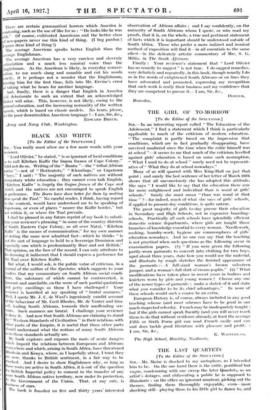BLACK AND WHITE [To the Editor of the SPECTATOR.]
Sni,—You really must allow me a few more words with your reviewer. •
Lord Olivier," he stated, " is so ignorant of local conditions as to call Kitchen Kaffir the lingua franca of Cape Colony.' 1 did not do so. Writing of the " Bantu "—the " tribal African native "—not of " Hottentots," " Kleurlings," or Capetown `. boys," I said : " The majority of such natives are without elementary white education : they cannot even talk English. ' Kitchen Kaffir' is largely the lingua franca of the Cape and Natal, and the natives are not encouraged to speak English in preference. The Boers have done better for them. by making lieu speak the Taal." No careful reader, I think, having regard to the context, would have understood me to be speaking of (apetown, or even of places " nearer the Kaffir border," but not within it, or where the Taal prevails.
I shall be pleased in any future reprint of my book to substi- ite your reviewer's phrasing " in some of the country districts of South Eastern Cape Colony, as all over Natal, ' Kitchen raflir is the means of communication," for my own manner if stating the same now admitted fact—which he thinks " is it the sort of language to hold to a Sovereign Dominion and .:peeially one which is predominantly Boer and not British." That opinion, on the face of the record, I can only attribute to I is deeming it indiscreet that I should express a preference for the Taal over Kitchen Kaffir.
But what, I would ask, is the public value of criticism, in a urnal of the calibre of the Spectator, which suggests to your readers that my commentary on South African social condi- 'MIS, the substance of which cannot be controverted, is morant and unreliable, on the score of such partial quotations and petty cavillings as those I have challenged ? Your 'reviewer is horrified at my speaking of " brutal manners." Well, I quote Mr. .1. C. de Waal's ingeniously candid account of the behaviour of Mr. Cecil Rhodes, Mr. de Venter and him- kg., leading South Africans, towards their unoffending ser- sank Such manners are brutal. I challenge your reviewer to deny it. And now that South Africans are claiming to stand " Western Standards of Civilization " in their relations with other parts of the Empire, it is useful that those other parts 81i0U111 understand what the notions of many South Africans as to those standards actually are. My book explores and exposes the roots of acute dangers "jell imperil the relations between Europeans and Africans everywhere and which, arising in South Africa, have threatened Rhodesia and Kenya, where, as I hopefully attest, I trust they are now, thanks to British sentiment, in a fair way to be theeked. And I desire to show; Englishmen why, so long as those roots are active in South Africa, it is out of the question For British Imperial policy to consent to the transfer of any more South African native territory, now under its protection, 1(' the Government of the Union. That, at any rate, is business of ours.- The book is founded on five and • thirty -years' interested observation of African affairs ; and I say confidently, on the authority of South Africans whom I quote. or who read my proofs, that it is, on the whole, a true and pertinent statement of facts which it is important should be understood outside of South Africa. Those who prefer a more indirect and ironical method of exposition will find it—in all essentials to the same effect—in the delicately artistic commentary of Mrs. S. G. Malin, in The South Africans.
Finally : Your reviewer's statement that " Lord Olivier has no remedy to suggest" is not true. I do suggest remedies, very definitely and repeatedly, in this book, though usually I do so in the words of enlightened South Africans or on lines they have advocated and promoted, expressing my recognition that such work is really their business and my confidence that they are competent to pursue it. —I am, Sir, &e., Ramsden.
OLIVIER.


































 Previous page
Previous page